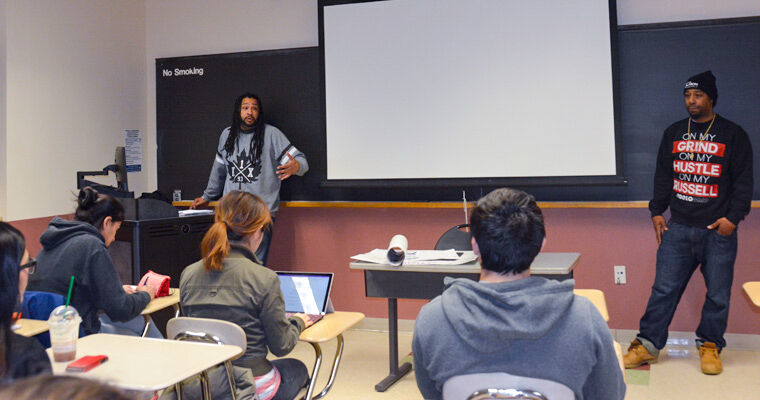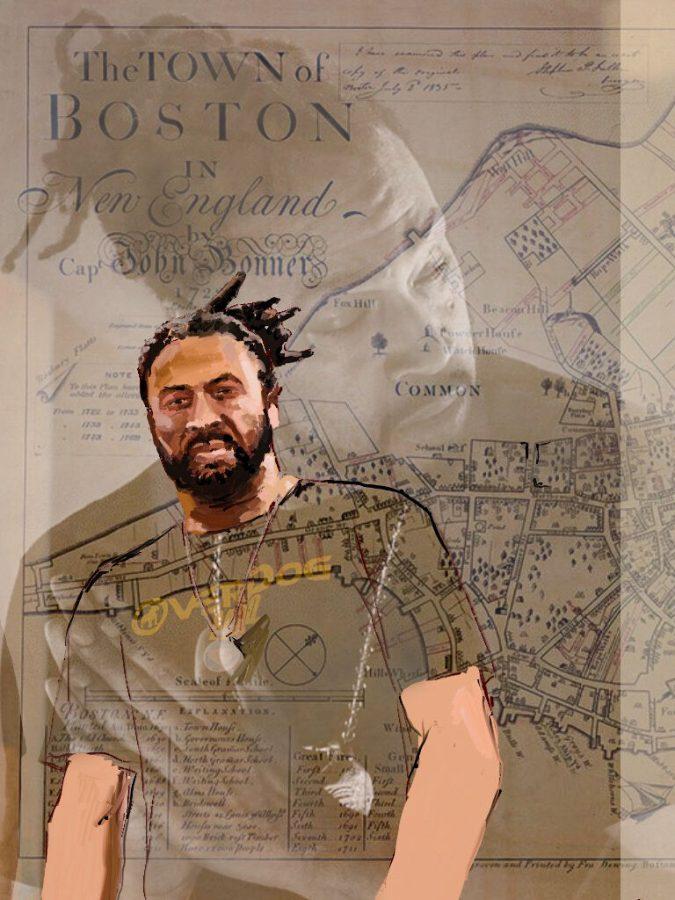In the late eighties and early nineties, an especially dangerous time for a young black man to be on Boston’s streets, Jared Bergman’s natural musical ability was “discovered”, and he was brought to a youth community center in Quincy called the “Rock Shop”. Jared, whose stage name is Akrobatik, grew up in Dorchester, says “the early nineties were violent times in Boston, mothers were shaking in their boots every time their kids left the house”. During the years of 1989-1991 there were 358 murders and almost 20,000 aggravated assaults in the city of Boston. In 1990 alone there were 143 murders (1), that averages out to almost three a week! At the Rock Shop, along with other young boys and girls, he danced, double-dutched, sang, and rapped day in and day out under the supervision of Tony, the manager. “That was hip-hop to me” Akrobatik said nostalgically, “operating at its best, engaging us as youth, giving us the opportunity to be competitive . . . without it leading to any kind of violence or anything like that.” I spoke with Akrobatik at his studio over video call and got the distinct impression that his time at the “Rock Shop” helped shape him into the man, artist, and professor he is today.
If you have the opportunity to take his class “The History of Hip Hop and Hip Hop as History” here at UMass Boston, do it. The class uses the uniquely American artform of rap and hip-hop as a vessel with which to explore and understand our history and social issues (2). Akrobatic loves engaging with the class, “The student body is amazing . . . I’m looking out at the classroom, and I was like them, in these same rooms. I was walking on that skywalk in ‘94 with Wu-Tang in my headphones going to class, you know? And now I’ve got students doing assignments on Wu-Tang, coming to class, writing papers on it and stuff like that.” With insider contacts developed over a lifetime in the world of hip-hop the class has an amazing set of guest speakers, like local Boston based mural and graffiti artists as well as rapper’s, authors, and activists like Chuck D. leader of the rap group Public Enemy and Edo G. of Ed O.G. & Da Bulldogs (3).
Akrobatik’s deep knowledge of the art forms history and culture is readily apparent “Hip Hop history is American history. It was born out of the rubble in New York City and now is a global phenomenon, and the most consumed form of entertainment in the world”. Although he had visited schools before, teaching was not originally in his plan, but in 2014 Professor Rachel Rubin invited him to her class to speak about his experience as a local hip-hop artist. “It just clicked right away; I just had a great time connecting with the students”. He was hooked, that class sparked something in him, and he’s been back teaching every year since.
Akrobatik acknowledges he was lucky to be involved with the mentors at the community center. He fondly recalls, “they were keeping kids off the street . . . all these kids from around the way, would meet up there and we’d have like dance groups and rappers practicing . . . I was getting on stage [competing] with big choreographed numbers and double-dutch teams, all this stuff going on, and I’d show up with like, a cassette with a beat on it, hoping that the tape didn’t pop during the performance!” He won many of those competitions, fueling his desire to hone his craft. He was beginning to build his identity; people began to know him as the rapper.
Even over a video call, Akrobatiks voice booms, no doubt, due to a lifetime of performing. Exceedingly positive, and introspective, with no perceptible “rapper” cliche or pretension. His “Street credentials” are legitimate, but it is his mind and words, and his steadfastness to the purity of his art that earn him respect; if you’re looking for a “gangster rapper” you’ll have to look elsewhere. “That’s just not who I am. It would feel weird representing that, because I don’t even know what that represents” Early on, he made the decision that although gangster rap has a place in the hip-hop cannon, it wasn’t his style. “There were younger artists like KRS1, and Chuck D, showed that even if you want to talk about the injustices that are going on around you, there is a lane for that too.”
He always loved language, and reading, and studied English in college. He jokingly says that winning the Boston city-wide spelling bee in second grade is his “favorite trophy”. Many years into his career, Akrobatik still enjoys creating and expressing himself through his music. “I love the way words flow together and I try to make them dance with the music.”
Like all great artists though, Akrobatik’s music holds a mirror up to our world, his music is deeply rooted in social issues. Songs like “Remind My Soul”, “The Ones”, and “HOH” tackle issues like race, gun violence, and oppression. “Here we go again” contrasts his experiences as a black man traveling relatively undiscriminated against through foreign countries and the discrimination he has experienced here at home.
His music is thoughtful, and his artful word play articulates strong ideas about life, society, and sometimes just having fun. His beats are smooth and rhythmic, with a percussive, old-school, east-coast feel, “with a little concrete in it” as he points out. He thinks deeply about his lyrical content, and his music has evolved as he has matured. Over time, he made the conscious decision to all but eliminate the “n” word from his music. “I think bias comes from that,” he says, “when people hear the n word or the b word a hundred times in a song, the first thing some people will think about is black people, and that makes my stomach turn, that we are being trained to only respond to those words in order to recognize who we are within the confines of hip-hop”.
“The normalization of violence, the normalization of killing people, the normalization of black bodies lying in the street bleeding, [normalization of] the excessive use of force,” Are points he addresses with the youth he encounters, “this is not entertainment. That shit should make you cry. It’s not entertainment.” He keeps a written message tacked on his fridge that says, “young black men dying is not entertainment.” He is concerned about future generations “of people of color are coming up, no one is telling them that. So, they’re completely de-sensitized, they think, it’s like, if you live more than thirty years, you’re just not cool. You must not be a legend then, nobody wanted you dead. That is cartoonishly stupid.”
In-depth racial discussions take place in his classroom “I remind students sometimes, like the white artists, they can change clothes, and all of the sudden America sees them as a regular kid again. No matter what I wear, when I show up with dreadlocks, it’s like, oh there’s a black person. Is he a threat? Should I be worried?”.
Like the mentors from his youth at the “Rock Shop”, Akrobatik helps guide young people in the UMass Boston community. “You wouldn’t believe how many of them come to me aside form class, can we talk about this or that, because they feel comfortable with me, because they hear all the stuff that I’m talking about in my music” He is genuinely humble about his role as teacher, “I feel like I am making as much of a difference doing this, as with anything I’ve done in my life. Being a rapper has been very rewarding, but you know, this is like the manifestation of all that stuff. Not just the rapping; the traveling, the ups and downs, all the politics surrounding everything, the business…So much that I’ve learned. It’s just been beautiful; I really do appreciate the students at UMass Boston. And I want to continue to serve them for as long as possible.”
Akrobatik is a socially conscious poet-philosopher, a businessman, an activist, and a professor, and he is also a really nice guy. I would describe him as intelligent, unpretentious, genuinely appreciative, and emotionally touched by his fans, and his students. We talked for almost two hours, and as we wrap up the interview, I recall him saying that “I’ve been to more countries than I can remember and the only time I’ve ever been harassed by a police officer in my life, has been the many times it has happened in the United States.” and I realize that, in his studio he is sitting in front of an American flag. He tells me that once while on stage he realized that his crowd didn’t look like an audience of rap fans, “my audience just looks like America”.
For the Faces of UMass Boston: a conversation with… We ask all of our guest to fill in the blanks of this question. Here is Akrobatik’s answer:
As a [free man], I feel [comfortable] in a room full of [people of any background].
Illustration of Akrobatik.






















































